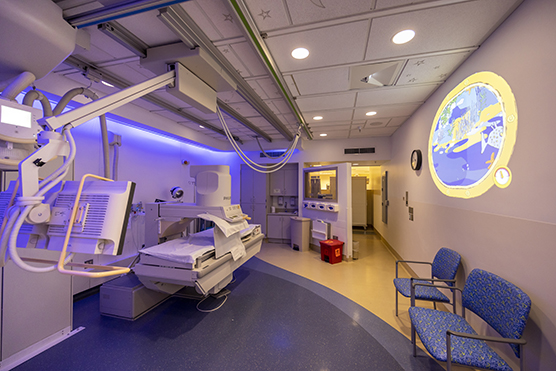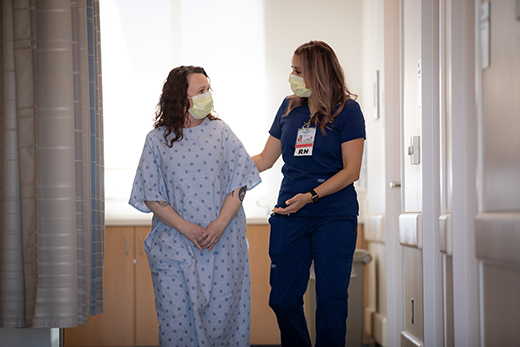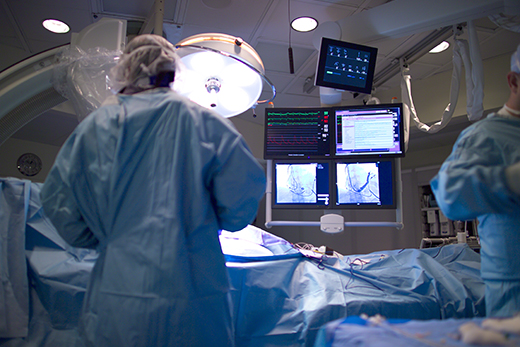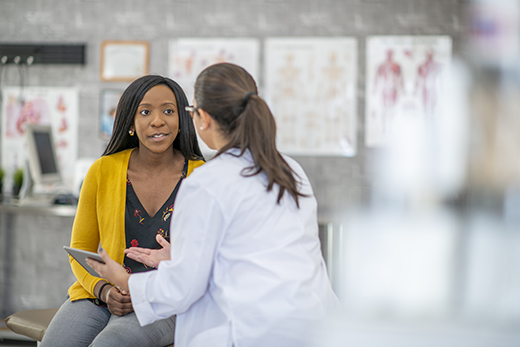Fluoroscopy
Fluoroscopy is a non-invasive procedure that helps us assess issues inside the body. UC Davis Health is home to complex imaging technology, offering you a broad array of options.
Medically reviewed by Elizabeth Morris, M.D. on Nov. 30, 2023.

Regional Experts in Fluoroscopic Procedures
Fluoroscopy uses pulses of X-ray energy to produce moving images of your vascular system, organs and joints. UC Davis Department of Radiology excels in fluoroscopic procedures. Advanced technologies help us carry out tests and treatments using high-quality images that require low doses of radiation.
Radiologists and interventional radiologists work alongside specialists in gastroenterology, gynecology, urology, orthopaedic surgery and cardiovascular medicine to best meet your needs.
Types of Fluoroscopic Imaging
We use fluoroscopy to help diagnose complex issues. It also provides precise imaging guidance for minimally invasive procedures and advanced surgeries throughout your body.
Barium Swallow or Enema
These procedures help detect issues in your upper or lower gastrointestinal tract. Barium, a substance you ingest or we place in your anus, makes it easier to view digestive organ functioning.
Cardiac Catheterization
Providers access your heart through a tiny incision using a thin tube with instruments at the tip (catheter). During this procedure, fluoroscopy shows blood flow through your heart, enabling us to pinpoint and treat blockages.
Hysterosalpingography
We use this procedure to check for blockages affecting your uterus or fallopian tubes.
Voiding Cystourethrogram (VCUG)
This test uses fluoroscopy to capture detailed images of your bladder and nearby tubes (urethra and ureters). The procedure also involves filling your bladder with fluid and observing functioning while you try to urinate.
Myelography
Myelography evaluates issues affecting your spinal canal (fluid-filled space between your spinal cord and its protective covering). We use it to diagnose spinal tumors, trauma, inflammation and infections.
Orthopaedic Procedures
Fluoroscopy helps surgeons deliver precise care. We use it to guide injections, ensure proper artificial joint placement and realign broken bones.
Stent Placement
Fluoroscopy guides minimally invasive procedures to place hollow mesh devices (stents) in narrow passageways. Stents help widen airways, blood vessels and ducts.
Request an Appointment
As Sacramento's No. 1 hospital, you'll benefit from unique advantages in primary care and specialty care. This includes prevention, diagnosis and treatment options from experts in 150 specialties.
Referring Physicians
To refer a patient, submit an electronic referral form or call.
800-4-UCDAVIS
Patients
Call to make an appointment.
Consumer Resource Center
800-2-UCDAVIS
The steps necessary to prepare for a fluoroscopic procedure depend on the type of test or treatment you need. Experts work alongside skilled technologists, nurses and support staff to help you have a safe, comfortable experience.
-

Before Undergoing Fluoroscopy
Do not wear clothing with metal, like zippers. We may ask you to change into a hospital gown. In some cases, it’s necessary to skip daily medications or arrive at your appointment with an empty stomach.
-

During Fluoroscopy
You’ll be awake For some fluoroscopic procedures, like VCUG or injections. For catheterization, we may give medication to help you relax and fall asleep. If we use fluoroscopy during surgery, you receive general anesthesia, which puts you to sleep and temporarily blocks sensation.
-

After Fluoroscopy
For outpatient procedures, there typically aren’t many limitations. If your exam involves contrast dye or barium, we may recommend drinking water to help clear it from your system.
What to Expect After Fluoroscopy
What happens after fluoroscopy depends in part on the type of test or treatment and your results.
Resuming Daily Activities
In many cases, you can resume daily activities after your procedure. If you do not receive sedation, you can drive yourself home and eat your usual diet after the test is complete.
Getting Your Results
We provide you with your results as quickly as possible — in some cases, immediately after the procedure. If additional review is necessary, you can obtain findings from your referring provider or our patient portal, MyUCDavisHealth, within a week.
Follow-Up Visits
Based on your fluoroscopic imaging test results, we schedule appropriate follow-up visits. Some people need to see specialists for ongoing care of chronic conditions. In other cases, additional appointments are not necessary.

Ranked among the nation’s best hospitals
A U.S. News & World Report best hospital in cardiology, heart & vascular surgery, diabetes & endocrinology, ENT, geriatrics, neurology & neurosurgery, and pulmonology & lung surgery.

Ranked among the nation’s best children’s hospitals
U.S. News & World Report ranked UC Davis Children’s Hospital among the best in neonatology, nephrology, orthopedics*, pediatric & adolescent behavioral health, and pulmonology & lung surgery. (*Together with Shriners Children’s Northern California)

Ranked Sacramento’s #1 hospital
Ranked Sacramento’s #1 hospital by U.S. News, and high-performing in aortic valve surgery, back surgery (spinal fusion), COPD, colon cancer surgery, diabetes, gynecological cancer surgery, heart arrhythmia, heart failure, kidney failure, leukemia, lymphoma & myeloma, lung cancer surgery, pacemaker implantation, pneumonia, prostate cancer surgery, stroke, TAVR, cancer, orthopedics, gastroenterology & GI surgery, and urology.

The nation’s highest nursing honor
UC Davis Medical Center has received Magnet® recognition, the nation’s highest honor for nursing excellence.

World-class cancer care
One of ~59 U.S. cancer centers designated “comprehensive” by the National Cancer Institute.

A leader in health care equality
For the 13th consecutive year, UC Davis Medical Center has been recognized as an LGBTQ+ Healthcare Equality Leader by the educational arm of America’s largest civil rights organization.
